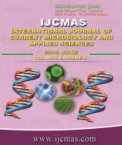


 National Academy of Agricultural Sciences (NAAS)
National Academy of Agricultural Sciences (NAAS)

|
PRINT ISSN : 2319-7692
Online ISSN : 2319-7706 Issues : 12 per year Publisher : Excellent Publishers Email : editorijcmas@gmail.com / submit@ijcmas.com Editor-in-chief: Dr.M.Prakash Index Copernicus ICV 2018: 95.39 NAAS RATING 2020: 5.38 |
Microorganisms play important roles in the recycling of agricultural wastes. Composting is the degradation of organic materials through the activities of diverse microorganisms. The compost generated by bioconversion of agro-residues offers several benefits such as enhanced soil fertility and soil health which can lead to increased agricultural productivity, improved soil biodiversity, reduced ecological risks and a healthier environment. This investigation examined the microbial community dynamics, loads and identification of microbiota at various stages of composting process. The compost produced from combinations of fresh and dry cocoa pod husk, Chromolaena odorata and cow-dung were assayed. Composts samples were randomly collected, isolation by standard serial dilution method and identification of microbes from compost materials were carried out at inception, 2, 4, 8 and 12 weeks after set-up of composting. Microorganisms isolated and characterized from the above composts include the species of bacteria viz., Pseudomonas spp., Staphylococcus spp., Streptococcus spp., Escherichia coli, Bacillus spp., Micrococcus spp., Proteus spp., Streptomyces spp,, Enterobacter spp., Serratia spp., Salmonella spp. and Shigella dysenteriae and fungi viz., Trichoderma spp., Geotrichum spp. Chrysosporium spp., Aspergillus spp., Yeast spp., Absidia spp., Mucor spp., Rhizopus stolonifer, Penicillium spp., Fusarium spp., Phimbens spp., and Microsporium spp. Of these isolates, Bacillus spp., Staphylococcus spp., E. coli and Streptococcus spp. are common to all stages of composting while Yeast, Mucor and Penicillium were the mycoflora common to all stages of the total microbial isolates. Composts supported high population level of bacteria (Bacillus 86.7%) while Yeast had 60% occurrence among fungi isolates. The microbial load of bacteria varied between 7x106cfu and 12x106cfu and 2x103cfu and 5x103cfu for fungi isolates. The associated isolates were highest (20 isolates) at 2 weeks of composting and the population decrease with maturity of the compost.
 |
 |
 |
 |
 |